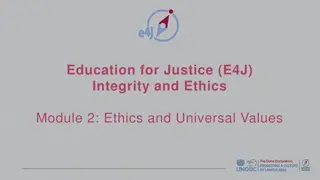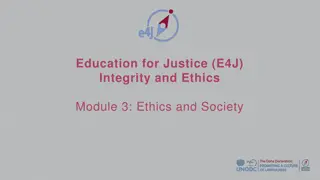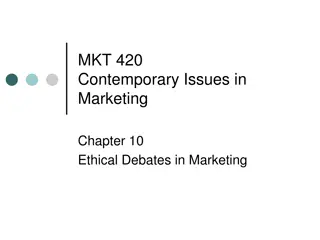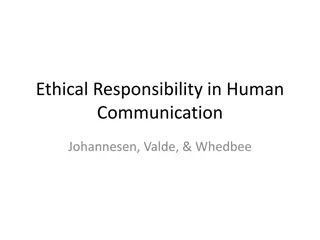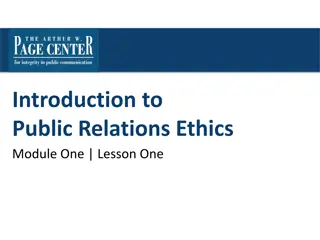Understanding Human Values, Ethics, and Ethical Frameworks
Human values and ethics play crucial roles in guiding human behavior and decision-making. Values such as respect, integrity, responsibility, fairness, compassion, honesty, trustworthiness, and cooperation are fundamental in shaping individual interactions with others and society. Ethics provide broader guidelines for determining right and wrong behavior, drawing from philosophical, religious, cultural, and legal sources. Common ethical frameworks include utilitarianism, deontological ethics, virtue ethics, and rights-based ethics.
Download Presentation

Please find below an Image/Link to download the presentation.
The content on the website is provided AS IS for your information and personal use only. It may not be sold, licensed, or shared on other websites without obtaining consent from the author. Download presentation by click this link. If you encounter any issues during the download, it is possible that the publisher has removed the file from their server.
E N D
Presentation Transcript
HUMAN VALUES AND HUMAN VALUES AND ETHICS ETHICS Lecture No. 1 Lecture No. 1 Ethics & Values Ethics & Values Dwity Sundar Rout Dwity Sundar Rout Assistant Professor Assistant Professor Department of Department of Agril Agril. Extension Education . Extension Education Centurion University of Technology and Management, Odisha, India
Human values Human values and ethics refer to the principles, ideals, and standards that guide human behavior and decision-making. They are fundamental beliefs and concepts that help individuals determine what is right and wrong, and how they should interact with others and the world around them. While values are personal and can vary from person to person, ethics are a broader set of principles that society deems acceptable and ethical behavior. Centurion University of Technology and Management, Odisha, India
Human values Human values encompass a wide range of aspects, including: 1.Respect: Treating others with dignity, consideration, and empathy, valuing diversity and individual differences. 2.Integrity: Acting honestly, ethically, and consistently, maintaining strong moral principles and adhering to them even when faced with challenges or temptations. 3.Responsibility: Being accountable for one's actions and their consequences, fulfilling obligations, and recognizing the impact of individual choices on others and the environment. 4.Fairness: Promoting equality and justice, ensuring impartiality and equal treatment for all individuals regardless of their backgrounds or circumstances. 5.Compassion: Showing kindness, understanding, and empathy towards others, and actively seeking to alleviate their suffering or distress. 6.Honesty: Being truthful, sincere, and transparent in communication and interactions with others. 7.Trustworthiness: Establishing trust through reliability, dependability, and maintaining confidentiality when necessary. 8.Cooperation: Promoting collaboration, teamwork, and mutual support, recognizing the value of working together to achieve common goals. Centurion University of Technology and Management, Odisha, India
Ethics Ethics, on the other hand, are broader guidelines or frameworks that help individuals and societies determine right and wrong behavior. Ethical principles often arise from philosophical, religious, cultural, and legal sources. Centurion University of Technology and Management, Odisha, India
Ethics Some commonly recognized ethical frameworks include: 1.Utilitarianism: The ethical theory that focuses on maximizing overall happiness or well-being for the greatest number of people. It emphasizes the consequences of actions in determining their morality. 2.Deontological Ethics: This approach emphasizes the inherent rightness or wrongness of actions based on principles and duties. It focuses on the intention behind actions and adherence to moral rules. 3.Virtue Ethics: This ethical framework emphasizes the development of virtuous character traits and moral virtues, such as honesty, compassion, and courage. It focuses on the cultivation of good character rather than specific actions. 4.Rights-based Ethics: This approach emphasizes the importance of individual rights and freedoms. It asserts that ethical behavior involves respecting and protecting the rights of others. 5.Ethical Relativism: This perspective suggests that ethical principles and judgments are relative to individual or cultural perspectives. It acknowledges that different cultures or individuals may have different ethical beliefs and practices. Centurion University of Technology and Management, Odisha, India
Human values and ethics It is important to note that human values and ethics can vary across cultures, societies, and individuals. However, they serve as important guiding principles to promote harmony, fairness, and well-being in interpersonal relationships, communities, and broader society. Centurion University of Technology and Management, Odisha, India
Thank you Centurion University of Technology and Management, Odisha, India











